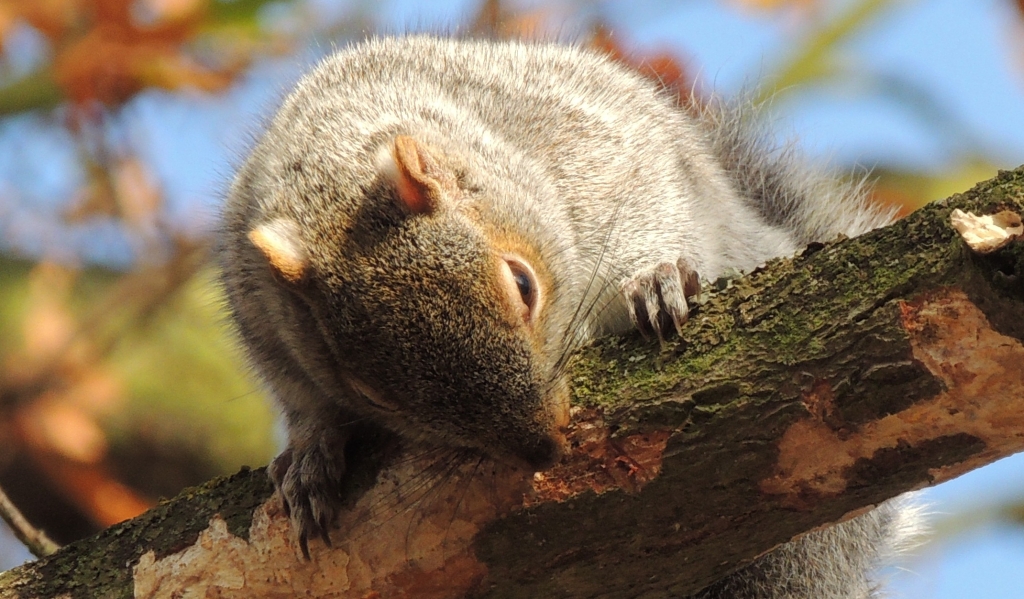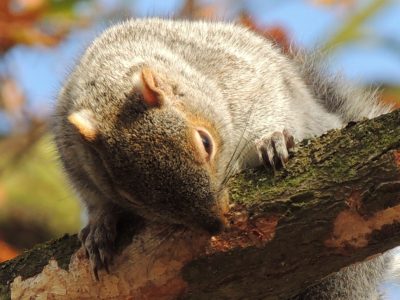Protecting the UK’s Trees from Grey Squirrels
 Can an oral contraceptive help ensure we have healthy trees and woods for the future?
Can an oral contraceptive help ensure we have healthy trees and woods for the future?
Grey squirrels are damaging important broadleaf trees and causing local extinctions of the native red squirrel. The oral contraceptive being researched by the UK Squirrel Accord (UKSA) is seen as a new hope for protecting tree health from this invasive species.
The grey squirrel situation is so serious that it was part of a key House of Lords debate on threats from tree pests and diseases – 13 February 2020 – and was directly highlighted by 14 of the 24 speakers. We need to work together on this problem to protect the UK’s trees.
A supporter of the work of the UK Squirrel Accord, Lord Gardiner of Kimble, Parliamentary Under Secretary of State for Rural Affairs and Biosecurity, said “I should also turn to the grey squirrel, how could I not acknowledge the noble Earl Lord Kinnoull and all that he and the UK Squirrel Accord are undertaking. With support from Defra, the Accord’s research to develop an oral contraceptive as an effective method for controlling grey squirrel populations is delivering promising initial results. Fertility control does have the potential to reduce grey squirrel populations and the spread of the squirrel pox virus.”
UKSA is fundraising for research into an oral contraceptive to tackle the negative impacts the invasive non-native grey squirrel causes to native red squirrels and broadleaf trees. Researchers are working to turn a proven injectable formulation into an oral contraceptive that will be delivered to grey squirrels via food in a species-specific feeding hopper.
The Earl of Kinnoull , Chair of the UK Squirrel Accord and Red Squirrel Survival Trust, said, “The UK Squirrel Accord has commissioned a fertility control project at the Animal and Plant Health Agency, which it is hoped will perfect a suitable active substance and hopper delivery method to allow fertility control to shrink grey squirrel numbers significantly, allowing forestry a chance.”
Progress at start of the third of the five-year project is good and hopes are high that this innovative work will provide an effective, less labour intensive, non-lethal method for managing grey squirrels. An update on progress can be read in our Researching a new hope for grey squirrel management blog post. Further information can be found in our FAQs document.
Research into the immunocontraceptive is being carried out by the well-respected Animal and Plant Health Agency (APHA). UKSA still needs to raise £250,000 to complete the project. Anyone wishing to support the research can donate online.
Grey squirrel damage
The Baroness Byford DBE, patron of the Leicestershire end of the National Forest, said, “Currently the National Forest for them grey squirrels and ash dieback have the greatest impact. Recent figures released by the European Squirrel Initiative, to which other noble Lords have spoken, show that grey squirrels are costing the English forestry in excess of £40 million per annum.”
Intensive bark stripping by invasive non-native grey squirrels creates wounds that pathogens can infect, stresses, weakens and can kill biodiverse and productive tree species. This is a serious issue for a country striving to plant more trees for wildlife, climate change mitigation, timber production and many other ecosystem services.
High densities of juveniles can strip bark from the main stem and branches of trees between April and September. Species particularly susceptible to damage include high-value trees such as oak, beech, hornbeam and sweet chestnut. Grey squirrels target young broadleaved trees, mostly 10-40 years of age, and repeat the damage year after year if their densities are high and unmanaged.
The oral contraceptive offers a real opportunity to halt grey squirrel population growth and reduce their numbers and negative impacts. Please donate to help fund our research to protect trees and red squirrel populations: www.squirrelaccord.uk/donate
Editor’s Note
The UK Squirrel Accord (UKSA) is a UK-wide partnership of 37 leading conservation and forestry organisations, Government agencies and companies, with links to voluntary red squirrel conservation groups. List of signatories: https://squirrelaccord.uk/about/partners/
UKSA works collaboratively to preserve the UK’s wooded landscapes and associated biodiversity under the following aims to:
- Secure and expand UK red squirrel, Sciurus vulgaris, populations beyond current thresholds
- Ensure UK woodlands flourish and deliver multiple benefits for future generations of wildlife and people
Further information on negative impacts of grey squirrel bark stripping are highlighted here:
- UKSA web page https://squirrelaccord.uk/squirrels/tree-damage-by-greys/
- National Forest blog on grey squirrel as the greatest threat to their trees:
https://squirrelaccord.uk/news/blog/biggest-threat-to-the-national-forest-grey-squirrels/
In 2019, the European Squirrel Initiative (ESI) released new figures estimating the cost of grey squirrel damage to the forestry industry to be in excess of £40 million a year.
ESI press release (please copy and paste link into browser if it does not work by clicking on it):
UK Squirrel Accord is a diverse partnership that represents a range of sectors as well as viewpoints. Communications, publications, blog posts and other statements and documents made or published on this website or under the name of the UK Squirrel Accord in any other location must not be taken as reflecting the views of all or any particular signatories to the Accord.
Kay Haw, UK Squirrel Accord Director
Email: [email protected]
Tel: 07597 171591

